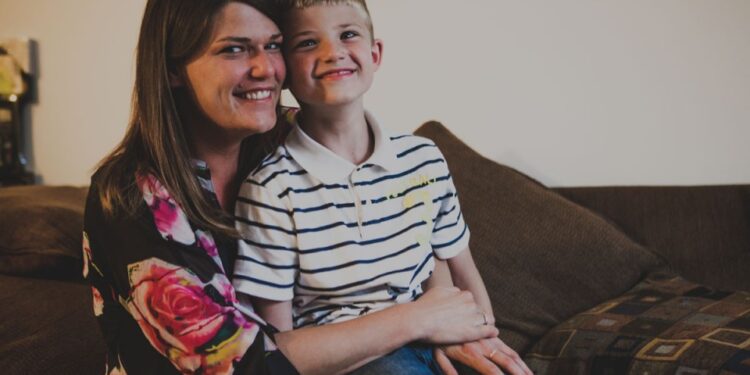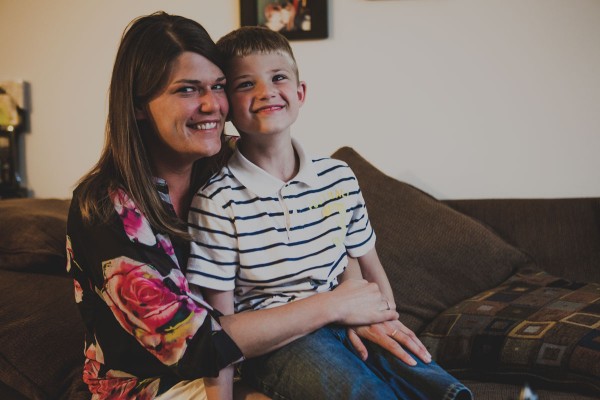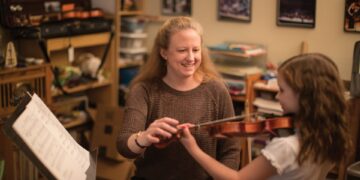Tara Ziesel has often had to ask for time off from her job for emergency runs to her son’s preschools. Her boy, Caden, was, as she says, “a holy terror.” When frustrated or angry, he lashed out with profanities and wild tantrums on his instructors. When mad, he has quite an arm. He was kicked out of numerous preschools around the city.
In kindergarten, he was suspended three times in his first 30 days. One of those days, Caden had ransacked the principal’s office by the time Tara arrived.
Here’s the thing, though: As in so many cases of kids lashing out, Tara had played a big role in Caden’s upsets. Caden was taken from Tara as a toddler because of Tara’s addiction to meth. “I was gone for months at a time, Tara says. “His grandmother had to take custody because of me. I was a bad mom and it hurt him.”
The goal of the Child Saving Institute’s KidSquad program, which Caden started in after being referred by his therapist, is not only to help children better understand and manage their emotions, but to also help heal strained relationships between parents and children that so often are the wellspring of the troubles.
“At the time I got sober [in 2009], our relationship was wrecked,” Tara says. “In the CSI therapy, we worked together, worked on building back our bond and trust. It’s had a profound effect on how we interact now. And it’s had a profound impact on how Caden interacts with others at school.”
The trick to KidSquad’s success is its holistic approach to tackling behavioral problems, says the program’s coordinator, Jana Habrock. CSI counselors work with psychologists, pediatricians, psychiatrists, school counselors, teachers, and caregivers to ensure that the child is getting the same instructions and care in all of his or her environments.
“We feel it’s so important for everyone in the child’s life to be on the same page,” Habrock says. “We all work together to teach the child healthy emotional literacy—mad, sad, frustrated; what is it I’m really feeling right now?”
There are three basic tasks at the heart of KidSquad, which CSI runs with the help of Lutheran Family Services, Heartland Family Services, and the Center for Holistic Development, among other organizations. The root problems must be identified. The child must be helped to identify those emotions that cause the problems. Then, effective coping mechanisms must be identified and taught so that the child turns to those mechanisms when they experience trigger emotions.
For example, Caden’s primary triggers for tantrums were feelings of frustrations and fear of change, his mother says. When he’s winding up, he’s directed to the coping mechanisms that have been found to work for him.
Sometimes, Habrock says, the tricks can be as simple as going to a “Coping Corner.” Sometimes a child will blow a pinwheel while concentrating on his or her breathing. Sometimes it helps to just knead a squishy ball for a while.
KidSquad has a full-time staff of 15 working with children throughout Douglas and Sarpy County. The program has expanded greatly in the last five years, Habrock says. Beyond helping individual children, Habrock says, the program’s staff is now going into preschools and school classrooms throughout the metro to teach instructors how to cope with and help troubled kids. Beyond working with 116 individual children, KidSquad educators assisted in 150 classrooms and 75 early childhood programs last year, Habrock says.
CSI staff will work with a child for four to six months on average, she says. But, there is no time limit. They’ll work with a child as long as necessary to get results, she says.
Caden stayed with the program for a year and a half. “He was a pretty angry kid when he came in,” Habrock says. “With his grandparents and his mom, we had to work through some pretty tough stuff.”
But, it was all worth it, Tara says. Caden, who will be a second grader this fall, will still have outbursts, she says, but they are now less severe and less common.
“It’s been a long process,” Tara says. “But he has come so far. He still has his moments, but he’s really doing well. Life is much better for both of us. Much more calm. We’re headed in the right direction.”














